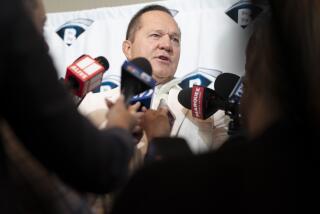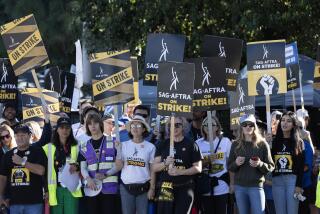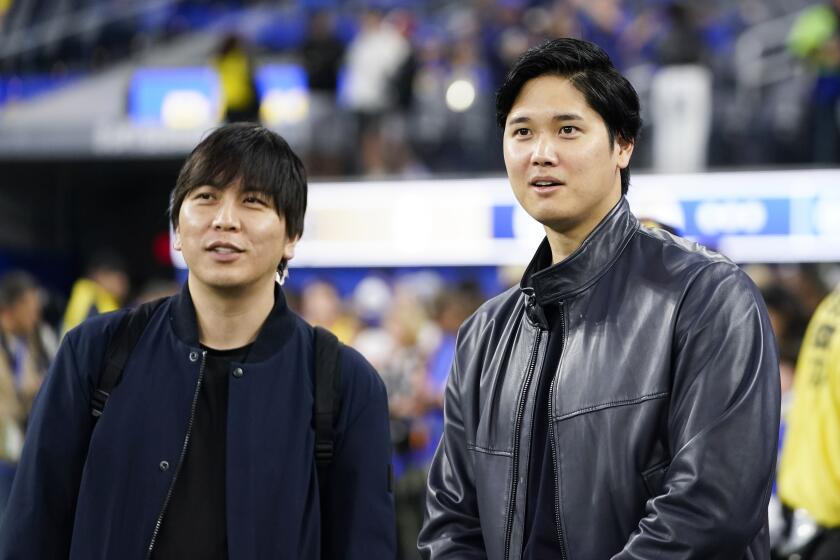Baseball Players, Owners Expect to Reach Deal to Avoid Shutdown
NEW YORK — Dollar by dollar, step by step, baseball’s players and owners moved closer this morning to an agreement that could avert the sport’s ninth work stoppage since 1972.
With optimism rising, the two sides worked past a 9 p.m. PDT deadline, with indications that a final deal was still several hours away. However, they were hopeful of reaching an agreement by 4 a.m. PDT, which was when the Boston Red Sox--the first team traveling today--needed to board a bus to catch a flight to a game in Cleveland tonight.
The representatives of club owners and the Major League Players Assn. were focused on clearing the final hurdle of a payroll tax on the wealthiest teams. The stakes were high, with players scheduled to strike before any games were played today unless a deal was completed. Fifteen games are on the calendar today, with the St. Louis Cardinals at Chicago Cubs scheduled to begin play at 12:20 p.m. PDT.
At games Thursday, fans made sure the baseball establishment knew just how unhappy they would be if the players struck. In Pittsburgh, one sign said, “Fix It or We Don’t Come Back.” Outside the B.U.S. bar near Houston’s ballpark, a message on a marker board said: “Monkey see, Monkey do-The players strike, The fans will too.”
In Anaheim, the atmosphere turned especially ugly as fans began chanting “No strike! No strike!” and showering the field with beach balls, water bottles, cups and other trash. Foul balls, usually trophies for those who catch them, instead became missiles, launched back onto the field.
Angel reliever Scott Schoeneweis, the team’s player representative, said he understood the fans’ frustration but “would have hoped that our fans would have had a little more class.”
“We’re not trying to ruin anybody’s parade,” Schoeneweis added. “We’re not trying to take the game away from anybody. We’re just trying to stand up for the issues at hand.”
In a midevening conference call with players, his second of the day, players union President Donald Fehr expressed optimism that an agreement could be reached, according to sources familiar with what was said. The sources said Fehr indicated it could go down to the wire, and complained that the owners were still “playing games” with the payroll tax. Still, he thought a deal would be struck.
“We’ve made moves to get to a point they want, and then they want more,” said one player who participated in the call, speaking on condition of anonymity.
Baseball Commissioner Bud Selig also had a conference call with his executive council Thursday. According to a club executive who spoke to a participant, Selig indicated he would let the talks go through the night and then complete the deal. The implication was that Selig would try to wrest as much as he could from the luxury tax negotiations.
“We’re closer,” said union counsel Gene Orza, after meeting with management negotiators Thursday night, “but I don’t know if we’re close enough to appease the owners.”
It appeared that the sides were prepared to compromise at a tax threshold somewhere between the $112 million proposed by the owners in the first year and the $120 million proposed by the union.
One obstacle to an agreement had been the union’s unwillingness to accept a tax in the final year of a potential four-year contract, but sources said the players were willing to compromise on that. However, the sources said, the union purposely set the threshold high, somewhere between $140 million and $160 million, since the final year’s threshold would become the floor in the first year of a subsequent bargaining agreement.
The negotiations took place on a cool, gray, rainy day in New York, with negotiators shuttling in and out of the Major League Baseball headquarters in a high-rise on Park Avenue. Players around the country hung on every announcement, with many packing in preparation for a strike.
“It doesn’t sound real good,” said Texas Ranger shortstop Alex Rodriguez, who would lose the most of any player, $114,754 a day. “You just have to prepare yourself for the very worst.”
The players were threatening to strike out of concern that the proposed combination of increased revenue sharing among clubs and a “luxury tax” on the payrolls of wealthy teams would effectively put a lid on salaries, which the powerful union won’t accept. The sides previously agreed on random steroid testing, raising the minimum salary from $200,000 to $300,000 and improving the pension plan. With those side issues out of the way, negotiators were able to focus on the biggest issues, as fans, players and owners waited anxiously.
“It’s sad and it’s disappointing, but the issues are important issues,” Schoeneweis said. “We’ve done our part. We’ve moved to the other side quite a bit, and there’s room for an agreement to be done. It just needs to get done.”
The Angels and the Dodgers are on paths that could lead to the playoffs, making the prospect of a strike especially painful. The Dodgers awaited word in Houston, where they were ready to either begin a three-game series against the Astros or go home.
“We’ve got this black cloud looming over us,” said Dodger outfielder Dave Roberts. “This is my first opportunity to play every day in the big leagues, and it’s been a good year for the Dodgers, and we’ve put ourselves in a position to go to the playoffs.... I hope that we can play this thing through.”
A White House spokesman urged the two sides to reach agreement, saying they should consider the effect a strike could have on the country as it approaches the anniversary of the Sept. 11 terrorist attacks.
“The owners and players need to keep in mind not only what a strike would do to the future of baseball, but also what it would to America during a time of national unity and national spirit,” White House spokesman Scott McClellan said after talking to President Bush about the potential strike.
However, McClellan said the president, a former Texas Rangers owner, would not intercede.
“This is something the players and owners need to resolve,” he said.
High-ranking officials from the commissioner’s office and the union traveled back and forth between their respective Manhattan headquarters, trying to resolve the most contentious issue in talks that resumed in earnest after the All-Star break. Negotiators declined to comment as they moved from building to building and were greeted by fans holding signs encouraging them to get a deal done.
It is believed team owners and players agreed on a plan for increased revenue sharing--transferring money from high-revenue to low-revenue clubs--during multiple morning and afternoon bargaining sessions Thursday, but they remained apart on the thresholds and rates for a payroll tax heading into late-night talks.
Under the previous union plan, the minimum payroll subject to taxation would be $125 million in 2003, $135 million in 2004 and $145 million in 2005, after which the tax would end. Owners proposed thresholds of $107 million in the first three years of the contract and $111 million in 2006.
As of late Thursday, owners had increased their offer to $112 million in the first two years, $116 million in the third year and $120 million in the fourth, sources said. The union was believed to be working with thresholds of $120 million, $125 million, $130 million and $140 million.
Management proposed that a team would be taxed at 35% the first time it exceeded the threshold, 40% the second time, 45% the third time and 50% the fourth time. The players proposed tax rates of 15% to 40%, and sources said the sides were working to find common ground on that key front.
On revenue sharing, a lawyer familiar with the situation said about $255 million would be transferred in the new basic agreement. Word emerged late Thursday that a compromise was reached to broker that portion of a deal. Under terms of the latest known union proposal, clubs would share 33.3% of local revenue, up from 20% under the current deal.
“I hope something will get done,” Schoeneweis said. “If something is not done, there won’t be baseball [today].”
*
Newhan reported from New York and Reid from Anaheim. Times staff writer Mitchell Landsberg and Associated Press contributed to this report.
More to Read
Go beyond the scoreboard
Get the latest on L.A.'s teams in the daily Sports Report newsletter.
You may occasionally receive promotional content from the Los Angeles Times.






